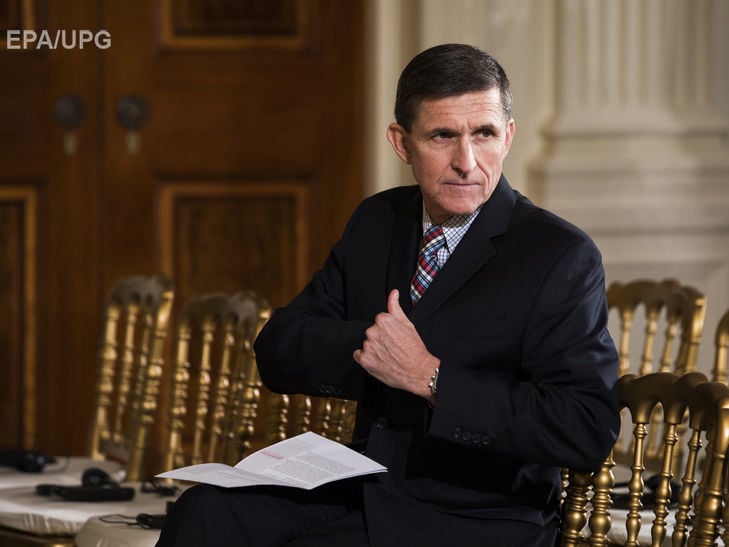|
While he was giving a speech at Republican national convention on July 20, 2016 Flynn joined public chanting "Lock her up" and accused Hillary Clinton of jeopardizing US national security. Among other things he said "If I, a guy who knows this business, if I did a tenth of what she did I would be in jail today". |
The famous "Lock-Her-Up" General may go to jail for treason. Let me tell you why: in 2015-2016 he has received approximately $600,000 in Russian money. Let me tell you how: a major portion of it came from the Russian bank Sviaz-bank when in December of 2007 Sviaz-bank issued a $150 million loan to the Turkish businessman Ekim Alptekin and his Dutch and Russian partners. This loan was never paid back, and in 2016, a minor portion of it, around $530,000, was paid by Alptekin to Lt. Gen. Michael T. Flynn. It never had anything to do with Turkey or lobbying Turkish interests. This was just the cover. It had everything to do with Russia and Putin.
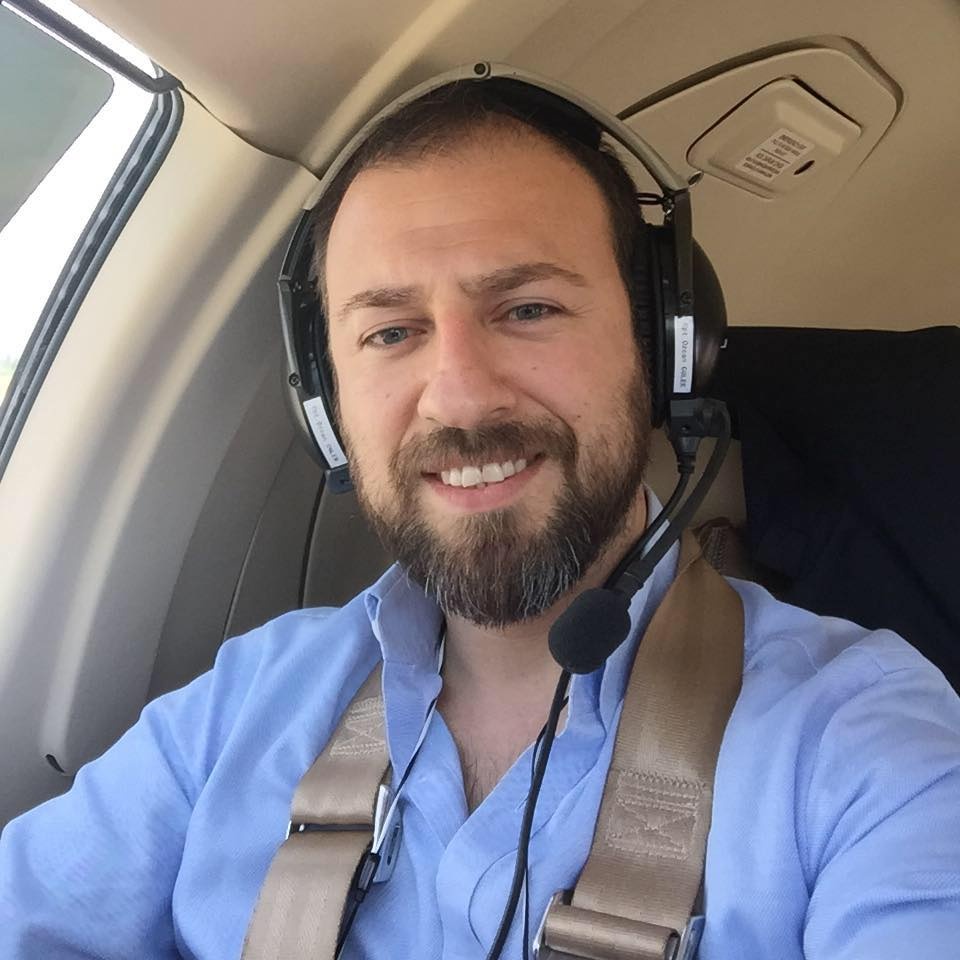 Ekim Alptekin worked with Flynn until November 16, 2016. Photo: Kamil Ekim Alptekin / Facebook
Ekim Alptekin worked with Flynn until November 16, 2016. Photo: Kamil Ekim Alptekin / Facebook
That is exactly why Flynn has registered himself as a lobbyist for Turkey only in March 2017 after massive payments to him became known to US law enforcement agencies and information about payments was leaked to the media. On March 7, 2017, Flynn filed with National Security Division under the Foreign Agent Registration Act (FARA) statement disclosing that his company – Flynn Intel Group Inc. – was paid $ 530,000 in September-November 2016 for the work on behalf of a small Dutch company Inovo BV, owned by a Turkish businessman Ekim Alptekin (who also owned other companies including Inovo Turkije). BV – in Dutch means “Besloten Vennootschap” – a private company. Flynn’s contract with Inovo BV was signed on August 9, 2016, according to one source, or on September 2016, according to the other.
The total amount was $600,000 for the three months of work. The last transfer of $145,000 was received by Flynn on November 14, 2016, when Trump was already elected as the President. Flynn’s “work” for Alptekin was now finished and he filed a termination report for the contract with Inovo BV indicating November 16, 2016, as a day of contract termination. The next day, November 17, 2016, he was named the National Security Advisor for the President-elect of the United States of America.
However, the paperwork on contract termination was submitted to the Senate only the next day after Justice Department had started showing signs of interest in Flynn’s interactions with Inovo BV. In addition, that paperwork showed that there was only $5,000 received by Flynn Intel Group Inc. for its services. That was a blunt lie. On March 10, 2017, The New York Times wrote: “that presumably indicates that he did not define most of the services he would provide Mr. Alptekin as lobbying under the law“. Well, $5,000 was earned for a lobbying work for Turkey. And the rest, $525,000, for something other than that? What could it be?
“I disagree with the filing”, – said Alptekin on the telephone from Istanbul in reply to the reporter's question about Flynn’s registered as foreign agent working for Turkey. – "It would be different if I was working for the government of Turkey, but I am not taking directions from anyone in the [Turkish] government". Indeed, Alptekin does not work for Turkish government and never did. His small Dutch company Inovo BV only showed losses in its financial reports, and was unable to pay $530,000 to Flynn unless it had previously received this money from elsewhere.
It all started in April 2014 when Lt. Gen. Michael T. Flynn, the head of the Defense Intelligence Agency, lost his job after less than two years in office. He somehow survived for the next year. In October 2014 he started his own consulting firm. ”The business was opaque, making little public, not even an address. When a reporter went looking for it last fall, he tracked it down to an Alexandria, Va., office building operating out of the nondescript headquarters of another firm, called the White Canvas Group. In the interview in October, Mr. Flynn offered only a vague description of the firm. He said he had clients in Japan and the Middle East and that he worked on cyber training, aviation operations and energy business,” – as The New York Times described Flynn’s business.
Then, a new employer came to help: the State of Russia. Since August 2015, Lt. Gen. Flynn started earning a salary of $11,250 per month. But his employer had to be creative.
For example, in August 2015, the $11,250 was received from a Russian charter cargo airline Volga-Dnepr Airlines. It continued in September 2015 with the payment of $11,250 from Kaspersky Government Security Solutions Inc., a U.S. subsidiary of Kaspersky Lab, a Russian-based cybersecurity firm. Well, you may ask any Russian, and he/she will tell you that Kaspersky's firm is affiliated with the FSB of Russia. But Flynn is not a Russian. He is а US General. He probably did not know. The same pattern continued with the monthly payments of $11,250 for October 2015, November 2015, December 2015 (for a total of $33,750 for three months). Nominally Flynn received this money for traveling to Moscow for a few days in December 2015. It was a fee for an interview for Russian propaganda TV channel ‘Russia Today’ (RT). During his stay in Moscow he took part in a celebration of RT’s 10th anniversary. At the ceremony he was seated at the same table with Vladimir Putin, what was widely covered by media worldwide.
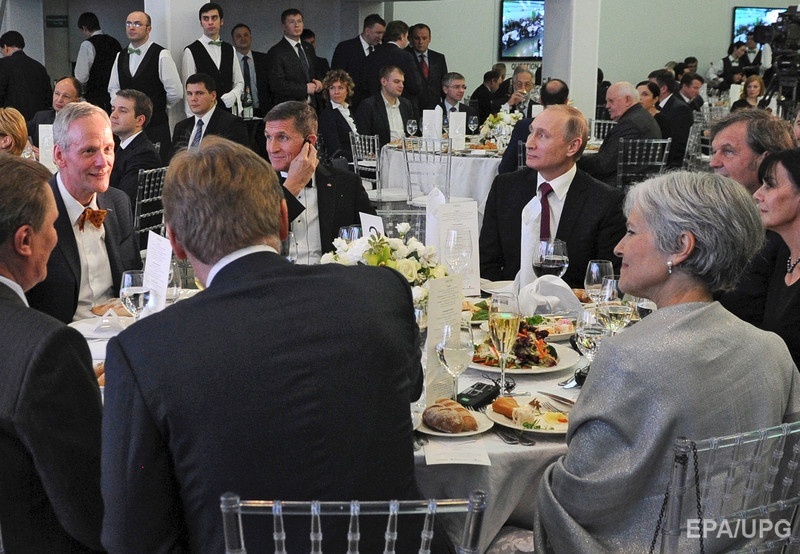 Putin and Flynn at RT news channel's 10th anniversary, December 10, 2015. Photo: EPA
Putin and Flynn at RT news channel's 10th anniversary, December 10, 2015. Photo: EPA
Let us not speculate from a moral high ground whether it is appropriate for US Lieutenant General to attend an event hosted by the Russian propaganda TV channel that in the course of 10 years devotedly occupied itself with anti-American propaganda. Moreover, the TV channel that just recently ran an extremely aggressive anti-Ukrainian campaign, which was used as a media cover-up for Russian military invasion in Ukraine in 2014 and for an occupation of certain territories of Ukraine, whose territorial integrity had been assured by Russia and USA by The Budapest Memorandum on Security Assurances of 1994.
Well, if one considers it acceptable to take $11,250 from Kaspersky Lab in September, it was only logical to receive salary from RT in October through December. In January 2016 the salary issuance was passed to Leading Authorities agency, a nominal organizer of Flynn’s Moscow appearance. But it is worth mentioning that two sets of business-class tickets to Moscow were provided for free to Flynn and his son, as well as their stay in Metropole Hotel and other little things, like guided tours and theatre tickets.
At the time, the media were very excited about Flynn being paid by the US strategic competitor as much as $56,250, or even $67,500, depending on a calculation method. With this background, even bigger sensation has arrived. It was discovered that Flynn was acting as a foreign agent for the Turkish government and that in 2016 he had been paid $530,000 for his lobbying work.
There is a spy-thriller film called The Fourth Protocol that tells a story of a British Secret Service official who was acting out of the best intentions when he handed over to a colleague from the South Africa some secret documentation. Little did he know, the colleague in fact was working for the USSR.
I have no idea if it would be a surprise, or maybe even a shocking surprise for Lt. Gen. Flynn to discover that after all, it was not the Turkish money he had accepted from Ekim Alptekin for the lobbying. Actually, it was the Russian money paid to Flynn in advance, so that he could be used later as an agent of influence holding the position of National Security Advisor for US President Donald Trump and promoting pro-Russia policy. The alleged work for the Turkish government was no more than a cover-up story, a disguise meant to distract American people and law enforcement from his shady or even criminal activities.
An agent has to be paid. He could be paid small amounts disguised as lecturer fees
There is no considerable doubt regarding Putin’s point of view as an FSB colonel who became Russian president in 2000: for him, an American officer on Russian payroll is a Russian agent. It doesn’t matter what the officer thinks himself. He may consider himself a successful businessman or a media star. For Putin, the money accepted seals the deal, and now Flynn is a recruited agent who could be and will be used.
An agent has to be paid. He could be paid small amounts disguised as lecturer fees. Or he could be called to Moscow and paid $45,000 ($33,750) for an interview. But the real problem is how you pay big time, hundreds of thousands, to a soon-to-be National Security Advisor for the President of the United States for his service as an agent in the future? And how you shield him from suspicion while doing it?
In search for an answer to these questions, we should get back to the first official transfer of $11,250 to Lt. Gen. Flynn’s account and then step further in the past, as far as 1990, when Russian Ulyanovsk Aviation Industrial Complex (now called CJSC Aviastar-SP or just Aviastar) has founded Volga-Dnepr Airlines that operates the cargo aircrafts An-124 called Ruslan. That was the very same company that was registered in USA as Volga Dnepr Unique AirCargo, and that was incorporated in Volga-Dnepr Group. And that was this company that had paid Flynn the first $11,250 for his participation in a Washington conference on Logistics and National Security in the Middle East and Africa.
11 years earlier, in 2004, Roland "Roel" Pieper from The Netherlands and Daniil Kazhdan from Russia established European Technology and Investment Research Centers (in abbreviated form: ETIRC) in Europe. Pieper was the president of all of the ETIRCs outside Russia.
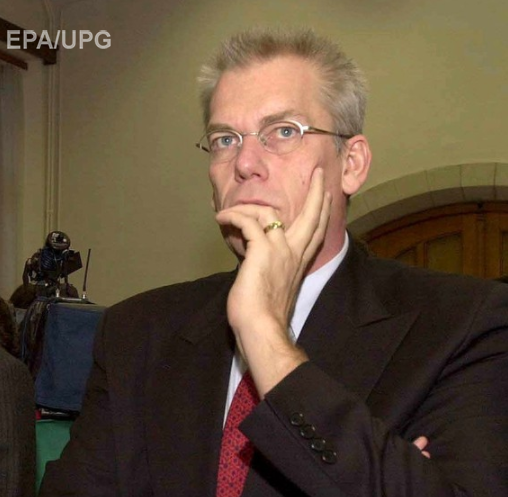 Roel Piper is an entrepreneur and an investor from the Netherlands. Photo: ЕРА
Roel Piper is an entrepreneur and an investor from the Netherlands. Photo: ЕРА
Meanwhile in Russia Kazhdan founded company ETIRK Holding Rus (Individual Tax Number 7729512144) with Kazhdan himself being the founder, the owner and the president of the company. Kazhdan’s ETIRK Holding Rus still exists in Russia, but somehow it has a different tax number – 7709669235. The original company filed for bankruptcy in 2013. It appears that Kazhdan was more widely known under the name Daniel Bolotin, a person who was frequently mentioned by the Russian and foreign media as an entrepreneur and an inventor.
This is how Bloomberg agency has officially described the company registered in Holland: "ETIRC BV offers outsourced technology solutions, and support and helpdesk services through a network of designers and programmers in Russia. The company provides services in the areas of software, outsourcing, telecom, aerospace, energy and utilities, patenting, mechanical engineering, and life sciences. It also offers services that range from developing capitalization structures, restructuring and recapitalization plans, and mergers and acquisition to initial public offerings to Russian, Turkish, and Eastern European governments; corporations; and financial institutions. In addition, the company offers sourcing and development of business alliances, joint ventures, privatization, and rest..."
Apart from The Netherlands, ETIRCs were registered in Belgium and Luxembourg. In addition to this, in 2005, ETIRK Holding Rus (i.e., Daniil Kazhdan) and Daniil Kazhdan as a private person established Joint Stock Company “STK Razvitie” (“Development”). This company still exists and runs business. Here are the examples of some of its customers: Gazprom, Transneft, Bank of Moscow, Alfa-bank, Rostelecom, Russian Railways, Mosenergo, Rosneft. It is easier to name a Russian company, which is not a client of enterprising Mr. Kazhdan.
In 2004, Kazhdan registered yet another company, ETIRK Aviation Rus. Just like in all other cases, he was the company’s sole founder. In 2012, Federal Antimonopoly Service of the Russian Federation accused this company of being a part of collusion between meat suppliers for Russian army, and in 2016, the company was liquidated. Simultaneously, Pieper and Kazhdan founded aircraft company ETIRC Aviation in Luxembourg. The companies’ titles suggested that both of them would specialize in aircraft construction.
At this point, it is necessary to make the next digression. In 1998, ex-Microsoft manager, who once had been hired as Microsoft’s eighteenth employee, Vern Raburn, established Eclipse Aviation, a company that, according to Wikipedia, had Bill Gates as its majority shareholder. The business was not so great but the company managed to produce jets in New Mexico under the label Eclipse-500 until 2008 when it was bankrupted by Alptekin, Pieper and Kazhdan. It should be mentioned that Pieper and Kazhdan used to the fullest their alleged connection to Bill Gates who, as a matter of fact, had no ties to their project: in Russia the jets were advertised as the ‘Bill Gates jets’. Here is what journalist Natalia Polat has written:
"The jets once engineered by Bill Gates will be assembled in Russia. Gates’ former colleague, director of European Technology and Investment Research Center (ETIRC) Roel Pieper has an intention to start an assembly line at Aviastar factory in Ulyanovsk. Last Saturday an ETIRC representative general director of Eclipse Europe Daniil Kazhdan visited Lenin’s hometown. He visited Aviastar to examine its production facilities set for construction of new aircraft named Eclipse-500. Eclipse-500 has drawn public attention in America even before the first machine left the factory. It is only explainable since Bill Gates, famous Microsoft founder, was one of the main authors of the plane project. This six-seater jet is designed for charter transfers on 500 – 1000 km, and the prices are going to be comparable to those for regular pre-scheduled flights. Maximum speed is 700 km per hour. The price of a plane is approximately $1,3m. There is the only one factory in America that produces these jets. And now Gates’ colleague Roel Pieper stakes on Russia. [...]
One month ago Pieper has gotten acquainted with Ulyanovsk governor Sergey Morozov at Russian economic forum in London. And Morozov has gotten interested in the Eclipse project. [...] ETIRC representative Daniil Kazhdan arrived in Ulyanovsk accompanied by Accounts Chamber’s auditor Sergey Ryabuhin. [...] The parties have already signed a protocol of cooperation. A re-equipment process will start at Aviastar this September. Roel Pieper is going to arrive on his private jet especially for the occasion".
Financial Izvestia, July 15, 2015
The reader of this article naturally would get an impression that Bill Gates is actively involved in his so-called “colleague” Pieper’s business. In fact, Gates and Pieper never really were “colleagues”.
On March 3, 2005, it was reported that Vnesheconombank (VEB) had signed a Memorandum of Understanding (MoU) with Eclipse Aviation Eastern Europe (Luxembourg) and Eclipse Aviation Rus (Russia). According to the MoU, VEB intended to invest in production in Russia of the Eclipse-500 jet designed by Eclipse Aviation Eastern Europe. Specific figures of planned financing were disclosed only in 2008. Pieper has estimated the project’s worth at $300m but only asked for one third of it from VEB. VEB has expressed willingness to loan $330m.
Important detail: the MoU subscription was a fraud. It appears that Eclipse Aviation Eastern Europe represented by Pieper and Eclipse Aviation Rus represented by Kazhdan simply did not exist. Kazhdan and Pieper did not produce any airplanes at that time. Eclipse-500 jets were manufactured in USA by US Company Eclipse Aviation that had no connection to Kazhdan and Pieper. They only acted as these jets dealers for Eastern Europe. Nevertheless, after getting the MoU with VEB signed, Pieper, acting as ETIRC’s president, made an announcement of intention to start Esclipse-500 production in Ulyanovsk on Aviastar aircraft factory. Notably, this was the very same factory that was a partner of Volga-Dnepr, from whom Lt. Gen. Flynn had received his first $11,250. In June 2005, Kazhdan arrived in Ulyanovsk for negotiations.
There was a detailed report on Ulyanovsk governor's website:
"On June 11 “Aviastar-SP” was visited by Accounts Chamber’s auditor Sergey Ryabuhin and European Technology and Investment Research Center (ETIRC) representative Daniil Kazhdan (Belgium). The purpose of this visit was to examine productive capacity of Ulyanovsk aircraft factory. ETIRC’s management plans to install at Aviastar an assembly line for a modern light-weight jet Eclipse-500. [...] After getting acquainted with Aviastars unique facilities, members of the delegation and region’s higher officials have signed a protocol of intentions and in this way have reached preliminary agreement. [...] This September the president of Belgic company will arrive to Ulyanovsk region to discuss more specifically cooperation between ETIRC and Aviastar".
Kazhdan had promised to invest no less than $80m. But the re-equipment of Aviastar that, according to the signed agreement, was scheduled to start in September 2005, has never commenced.
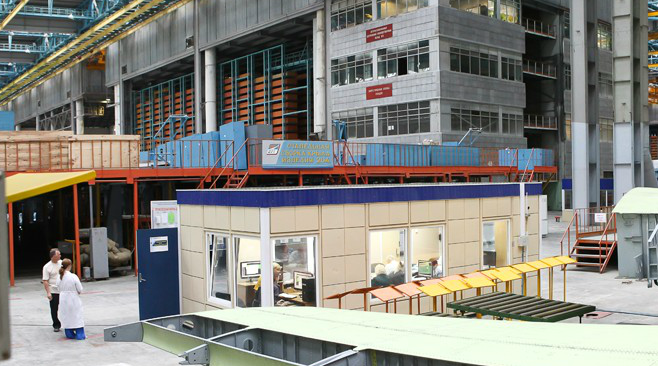 "Aviastar" specializes in production of transport aircraft IL-76MD-90A, passenger and cargo aircraft of the Tu-204 family, service maintenance of AN-124 Ruslan transport aircraft. Photo: aviastar-sp.ru
"Aviastar" specializes in production of transport aircraft IL-76MD-90A, passenger and cargo aircraft of the Tu-204 family, service maintenance of AN-124 Ruslan transport aircraft. Photo: aviastar-sp.ru
On November 1, 2005, RBC Daily announced that Pieper and Kazhdan had decided to make planes not in Ulyanovsk but in Voronezh, through Voronezh joint-stock aircraft society. Tri-partite agreement between Eclipse Aviation Eastern Europe, Voronezh region state administration and VEB was planned to be signed on October 31. However, “at the request of the Luxembourg party,” the signing was “postponed until mid-November”. At the same time, VEB’s press-office reported that they had no information about the date of the contract signing. Bank has also refused to disclose any financial data related to the project. The journalists did not succeed in getting any official comments from Russian representatives of Eclipse Aviation Eastern Europe, which is not surprising since neither the company itself nor its representatives apparently existed.
On May 9, 2006, Turkish newspaper Bigpara.hurriyet reported that ETIRC was owned by Turkish businessman Ekim Alptekin, the same person who would pay $530,000 to General Flynn in 2016. In a conversation with Isaac Arnsdorf, the author of “Flynn’s Turkish lobbying linked to Russia” published in Politico on April 25, 2017, Alptekin stated that ‘he hired Flynn with his own money and did not coordinate any lobbying for the Turkish government’. Alptekin also said to Arnsdorf that ‘as a partner in an investment group called ETIRC as early as 2006, [he] bought a stake in a New Mexico jet manufacturer called Eclipse Aviation.’ As it will be demonstrated below, the stake in Eclipse Aviation was purchased significantly later, after Alptekin and his partners obtained a $150m loan from Russian Sviaz-bank.
After Alptekin had joined Pieper-Kazhdan’s business ETIRC, some really fantastic things started to happen with Eclipse-500 jet project. In December 2007, Russian Sviaz-bank lent $150m to ETRIC Aviation, Pieper-Kazhdan’s company, incorporated in investment group ETIRC that was now co-owned by Alptekin. According to the Russian Accounts Chamber’s opinion it was Kazhdan (Bolotin)’s responsibility to arrange Sviaz-bank’s loan: “In a way Bolotin was managing Pieper’s business in Russia,” – speculated Russian governmental agency.
On January14, 2008, US company Eclipse Aviation made an official statement that
"it will expand its partnership with European Technology and Investment Research Center (ETIRC) Aviation. The agreement between the two companies includes an equity investment by ETIRC in Eclipse that is substantially in excess of $100 million. […] Upon completion of the equity investment, ETIRC will be the single largest shareholder of Eclipse Aviation. ETIRC CEO Roel Pieper has been elected non-executive Chairman of Eclipse Aviation. ETIRC is currently the exclusive provider of sales, customer service, maintenance support and flight training for the Eclipse-500 in the countries of Eastern Europe, the Russian Federation, the Commonwealth of Independent States and the Republic of Turkey.
Under the new arrangement, ETIRC will add Western Europe and the United Kingdom to its distribution and services area. As a result, ETIRC will be the exclusive partner for Eclipse in more than 60 countries. As part of its expanded partnership with Eclipse, ETIRC has the right to establish local assembly of the Eclipse-500 within its expanded region, helping Eclipse Aviation reach its global volume production goals. ETIRC is in advanced stages of discussions for the location of the assembly facility. The City of Ulyanovsk in Russia is the leading candidate at the moment. [...] ETIRC Aviation is headquartered in Luxembourg and has offices in Moscow, Istanbul and Cyprus”.
On January 17, 2008, Russian newspaper Vedomosti reported with a reference to Financial Times that Luxembourg-based ETIRC headed by Roel Pieper had purchased large share in American aircraft manufacturer Eclipse Aviation, and now had plans to partly relocate production to Russia, most likely to Ulyanovsk. It was assumed that assembly works would start in Russia by the end of year 2009.
Here is how it was described by Russian Accounts Chamber:
"In January 2008, amidst US financial crisis, Eclipse Aviation that was experiencing financial difficulties has received a lucrative offer from [...] ETIRC Aviation to purchase its share for more than $100m. [...] Right after the deal was done with a financial assistance from Sviaz-bank, the prospect of relocation production to Ulyanovsk became real.“
In February 2008 in Ulyanovsk a ceremony of laying the first stone of the new Eclipse-500 enterprise was held. Vern Raburn, who was announced as ETIRC Aviation president, took part in the ceremony, as well as Sergey Stepashin and other officials (Regnum, February 20, 2008). Stepashin promised to take the project under “personal control.” “This is the modern innovative project! This is the know-how made by the Bill Gates’ colleagues – our actual American and Dutch partners”, – said Stepashin according to Industrial Weekly.
And now a few words about Sergey Stepashin, at the time, the Head of Accounts Chamber of the Russian Federation. According to newspaper Vedomosti (December 27, 2010), Stepashin was the person who promoted Kazhdan-Pieper-Alptekin’s project in Russia. Prior to this, some years ago, Stepashin was “might-have-been” Putin. He was the Head of FSB in 1994-1995, while Putin was the Head of FSB in 1998-1999. Stepashin started first Chechen war in 1994-1995, while Putin started second Chechen war in 1999. Stepashin served as Russian prime-minister right before Putin and was replaced by Putin in August 1999. All in all, he was expected to succeed Yeltsin as the President of Russia but under the influence of circumstances, Putin got the post.
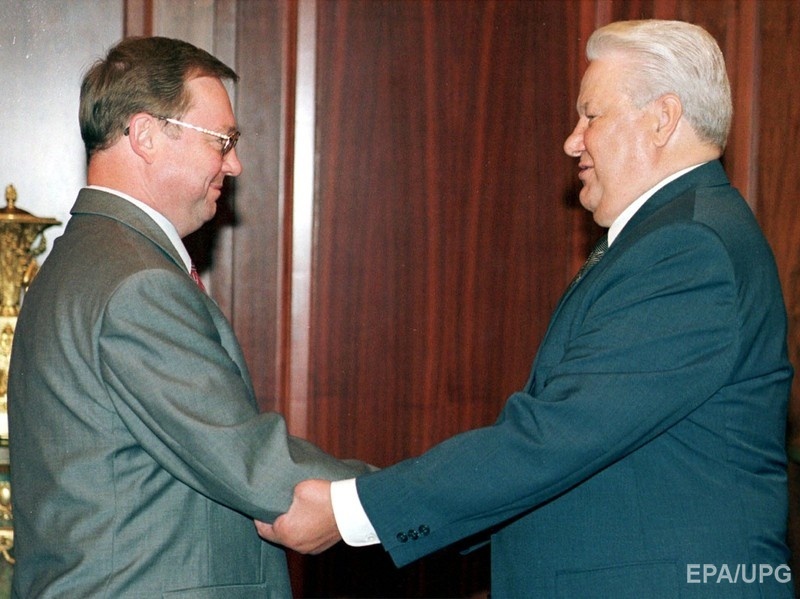 Sergei Stepashin and Boris Yeltsin in July 1999, a month before Putin's appointment as the prime minister. Photo: ЕРА
Sergei Stepashin and Boris Yeltsin in July 1999, a month before Putin's appointment as the prime minister. Photo: ЕРА
In June 2008, Interdepartmental tender committee, using Stepashin’s support, sanctioned creation in Ulyanovsk of a special economic zone. Volga-Dnepr Airlines, Aviastar and ETIRC indicated willingness to participate in the special zone. In June 2008, Pieper announced that overall costs of the aircraft project will come to $300m, $100m of which ETIRC Aviation was going to borrow from VEB (RBC Daily, June 4, 2008). This is in addition to the loan it already had received from Sviaz-bank. In September 2008, VEB stated that they were ready to invest $330m in manufacturing and after-sales service facility for Eclipse-500 jets in Ulyanovsk (Vedomosti, September 16, 2008). However, a global financial crisis which erupted in September 2008 caused VEB to quit the deal.
In July 2008, Founder and CEO of Eclipse Aviation, Vern Raburn, has been discharged and Pieper took his place as the Chairman of the Board of Directors and the President. In August 2008, Eclipse Aviation’s clients who had paid in advance filed lawsuits after facing severe delivery delays and inability to get refunds. That autumn, Pieper and partners filed for bankruptcy on behalf of Eclipse Aviation. In January 2009, the bankruptcy court allowed company’s assets to be sold. That same year, group of investors, including Ekim Alptekin, used assets bought from Eclipse Aviation to create Turkish company EA Aerospace. Ekim Alptekin passed for its owner. Notably, on his Linkedin page, Alptekin identified himself as the company president since 2008.
Legal issues were resolved by the end of 2010. In December 2010, Turkish media Hurriyet reported than Ekim Alptekin and two of his business associates who had earlier acquired failed American aircraft company had intention to relocate production to Turkey. “Now Turkey has the highest chance to host the production,” – said Alptekin in an interview for Turkish press. “We bought a company whose investing value comes to $1.5bn for just $100m. Our next step is making Turkey a main base for aircraft construction.”
Elementary calculations show that if $100m was paid for Eclipse Aviation after receiving $150m loan, the $50m, plus the assets of the American company, was left in the pockets of those who were involved. It appears that their gain was even larger. On June 15, 2005, Financial Izvestia published Kazhdan’s interview where he said: “As for now, we have received orders for 100 Eclipses from prominent businessmen. And what’s important, they pay in advance.” If advertised price for a jet was $1.3m, the total amount of prepayments had to be $130m, which means that Eclipse Aviation acquisition could be financed by the prepayments alone. Hence, it is possible that the $150m in borrowed funds remained intact.
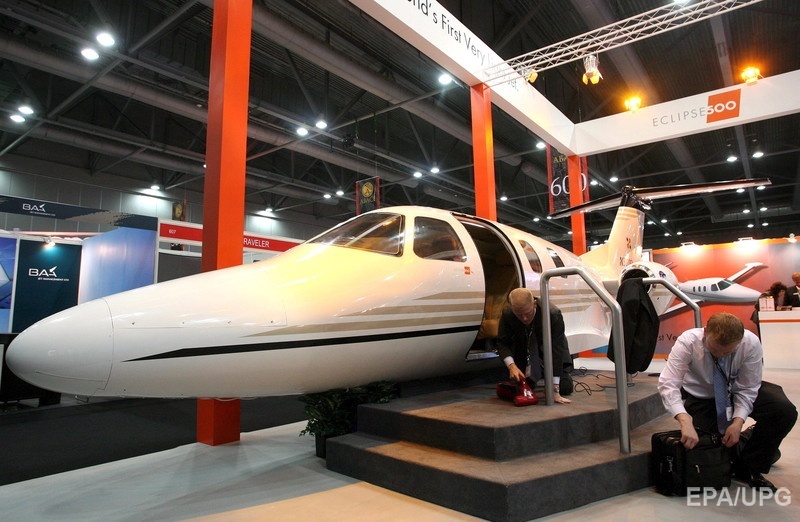 Eclipse 500 – lightweight jet, capable of carrying up to four passengers. Photo: eahavacilik.com
Eclipse 500 – lightweight jet, capable of carrying up to four passengers. Photo: eahavacilik.com
At the time, there were two experienced bankers in charge of Sviaz-bank that had lent the $150m in question: Andrey Kazmin and Alla Aleshkina. Until 2007, they had administered Sberbank, the largest state-owned bank of Russia. It seems impossible that they did not realize that lending $150m to Alptekin-Pieper-Kazhdan without proper securitization was a reckless move that would put the bank in harm’s way. Nevertheless, the loan was issued. Afterwards, the unsecured loan has been investigated.
According to Aleksandr Baryaev, investigation officer with the Central Investigation Department (GSU), there was a criminal case (Art. 201”Abuse of authority”) filed by GSU on October 15, 2008. It was based on Central bank examination of Sviaz-bank that had revealed unpaid debt of $150m lent to ETIRC for Eclipse deal. But as Baryaev recalled, there was no one suspected in that case. And the loan itself was written off the bank’s balance sheet (Vedomosti, July 8 & December 27, 2010).
Alptekin, Kazhdan and Pieper successfully solicited numerous orders and then used them to borrow from banks with no intention to pay back
To those who are familiar with the state of affairs in modern Russia, it would be clear that such a fraud would have a chance to remain undetected and unpunished only if the government itself was standing behind it. Boris Rybak, General Director of Infomost, a consulting company, gave a rather critical appraisal to Eclipse Aviation project: “It was a brilliant innovative shady deal.” Eclipse-500 was advertised as the first affordable private jet for $1m (the real price was $2.5m). Advertising a $1m price, Alptekin, Kazhdan and Pieper successfully solicited numerous orders and then used them to borrow from banks with no intention to pay back.
“Eclipse Aviation, USA, has got bankrupted and as a result, shareholders lost their shares” – Pieper said in one of his interviews, – “So ETIRC Aviation does not own anything anymore. [...] Neither ETIRC Aviation nor any of the shareholders are involved in any aircraft projects anywhere in the world. ETIRC Aviation has ceased to operate and currently, it is about to be liquidated”.
But after they bankrupted Eclipse Aviation and ETIRC Aviation the partners switch their attention to other, still operating companies. On March 2, 2009, Ukrainian government’s web site published information concerning Pieper’s and Kazhdan-Bolotin’s intention to obtain a $50m loan in Ukraine in order to produce there… Eclipse-500 jets. Here is the relevant announcement:
"The First Vice Prime Minister of Ukraine Olexandr Turchynov held a meeting with Head and President of the European Technology and Investment Research Centre (ETIRC) Roland Pieper and Daniel Bolotin. [...] The interlocutors discussed a possibility to introduce by ETIRC a project in creating a Ukrainian air-taxi operator with the use of Eclipse 500 jets. The project envisages creating a network of service Eclipse-500 centres and a broad system of air-taxis. Also the parties considered an opportunity to manufacture the aircraft on the territory of Ukraine in the future. At the first stage of realization of the project, the expected amount of investments equals around 50 million dollars".
Given that, by tradition, an aircraft industry is highly classified in Russia, we can surmise that from the very beginning – i.e., since in 2004 when numerous ETIRCs started to pop up – it was all a part a complicated FSB operation conducted right in front of us, which involved Eclipse Aviation acquisition and subsequent chain of bankruptcies. As a result, there were dozens of millions of dollars laundered and transferred outside Russia in order to be used at discretion of Russian government – for example, to pay a reward to future (and former) Trump’s National Security Advisor Lt. Gen. Flynn.
Let us keep in mind that it were Alptekin’s actions that have drawn attention to $530,000 payments for Flynn’s benefit. It is also remarkable that Alptekin had never mentioned in his professional internet profile any of the episodes described in this article. He totally omitted ETIRC stories, as well as Eclipse Aviation bankruptcy and his relationship with Pieper-Kazhdan. More than that, Alptekin also has never explained how he managed to avoid any claims from Russian government after he, an ordinary Turkish businessman, had failed to return $150m to Russian Sviaz-bank.
Anyway, one thing is obvious. In conversation with Isaac Arnsdorf, who wrote a much-discussed article in Politico, Alptekin "acknowledged ETIRC’s negotiations with the bank [VEB] chaired by Putin, but said he never interacted with any Russian officials. There are no Russians involved in the new company", he said. Well, this is questionable. What happened to Kazhdan-Bolotin? He was in his old company, the one that borrowed $150m. Furthermore, Alptekin lied when he told Arnsdorf he never met any Russian officials. At least once, in July 2009, Alptekin visited Russia.
On June 24, 2009, Ulyanovsk city newspaper UleyGrad published a short story titled “Ulyanovsk strengthens business ties with Turkey and Israel”. Among other things, it reported:
"Ulyanovsk region governor Sergey Morozov had a meeting in Moscow with Ekim Alptekin who represents the government of Turkey. During negotiations the parties expressed interest in development of cooperation between Ulyanovsk region and Turkey. The parties agreed to discuss the proposed cooperation in greater detail during the course of Ekim Alptekin’s visit to Ulyanovsk. According to Sergey Morozov, the first steps in cooperation would take place in high technology manufacturing, construction and real estate inducstries”.
One can only wonder what other ties to Russia and Russian officials are hushed up by Ekim Alptekin who “represents the government of Turkey”.


 +3 Kyiv
+3 Kyiv
